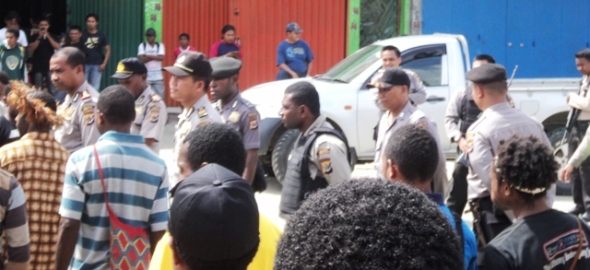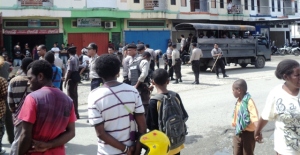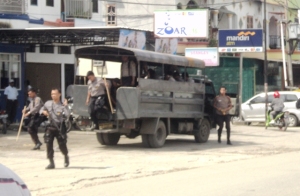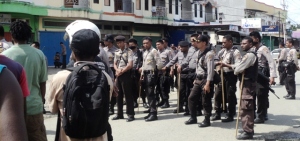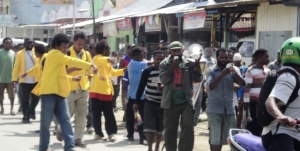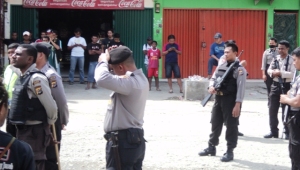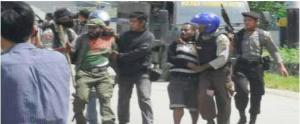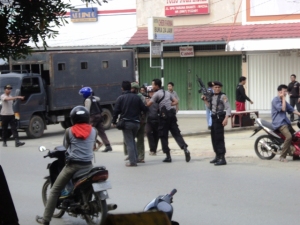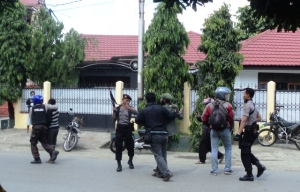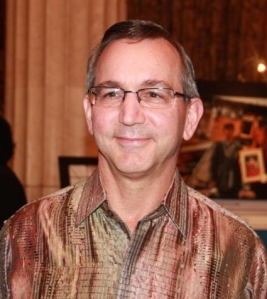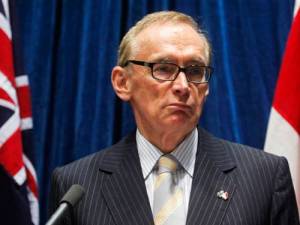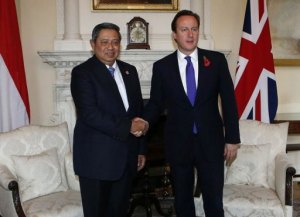Speech – Selpius Bobii – Front Pepera Papua Barat
(From : Selpius Bobii ( A political prisoner of conscience), General Chairperson – THE UNITED FRONT OF THE STRUGGLE OF THE PEOPLE OF PAPUA (FRONT PERSATUAN PERJUANGAN RAKYAT PAPUA BARAT (FRONT PEPERA PB))(From : Selpius Bobii ( A political prisoner of conscience), General Chairperson -
THE UNITED FRONT OF THE STRUGGLE OF THE PEOPLE OF PAPUA
(FRONT PERSATUAN PERJUANGAN RAKYAT PAPUA BARAT (FRONT PEPERA PB))
“ One History Together – The Morning Star ”
( 1 December 1961 – 1 December 2012 )
THANKS TO GOD
To the community of the Papuan Nation and the International community in solidarity wherever you may be. Firstly it is proper that we give thanks and praise to God the Almighty as it is through God’s help, guidance and Grace that we are able to serve on the face of this earth.
Allow us this day that is a historical date for the people of Papua, to convey this message and letter of address to you all.
THE PEOPLE OF PAPUA IN THE STATE OF WEST PAPUA ARE READY FOR
TO HAVE SOVEREIGNTY.
The nations of the world and the United Nations at this time need to recognise the state of the Federal Republic of Western Papua (NFRPB) at law and to speed up the process of return of control of administration from the Republic of Indonesia to the Federal Republic of Western Papua as a matter of urgency to save the race of Papua from discrimination, marginalisation, injustice, becoming a minority in the land of our ancestors and extinction of our race by creeping genocide.
Freedom of Sovereignty is truly the unconditional right of the people of every nation in the world and this right cannot be undermined by anyone, by any means or with any power as it is an absolute right that is inseparable from the indigenous peoples of a land and which is guaranteed under the General Declaration of the Human Rights of the United Nations and various other international legal instruments regarding self-determination of indigenous peoples.
As Papua also has that same right to full sovereignty as do other nations in the world that have already had their independence recognised, so we have proclaimed our sovereign independence as a nation within the political manifesto of the nation of Papua that was first proclaimed by the National Committee of Papua (KNP) in the final session of the First National Congress of Papua on 19 October 1961. This Manifesto was approved by the Papuan Parliament on 30 October 1961 following which it was given permanent recognition by the Dutch Government on agreement by the Dutch Queen Yuliana. Then on 1 December 1961 the people of Papua through their representative Papuan Parliament (The Nieuw Guinea Raad ) celebrated their sovereign independence as the Nation of Papua and this was sealed with the raising of the flag of the Nation of Papua, the Morning Star (at that time alongside the flag of the Dutch Kingdom) and accompanied by the national anthem of the Nation of Papua ‘Hai Tanah Ku Papua’ – ‘Oh My Land Papua’ (which at that time was also together with the Dutch national anthem ‘Wihelmus’).
The sovereign independence of the nation of Papua was defeated by President Soekarno of the Republic of Indonesia with the Declaration of Trikomando (referred to as ‘Trikora’) on 19 December 1961 when occurred:
a) The breaking up of the declared State of Papua as a creation of the Dutch Colonisers.
b) The Flying of the Indonesian Red and White flag throughout the land of Papua (then called Irian Jaya)
c) Preparation for public mobilisation to be achieved through a military invasion of the land of Papua.
However it is important to note that with this first point of the Declaration of Trikora, the President of Indonesia actually acknowledged the legal existence of the State of Papua. The existence of a State of Papua had been clearly established, even though the then President insulted the State of Papua by referring to it as but a ‘puppet state’ and by acting to dismantle the Papuan State.
The annexation of the independent sovereignty of the Nation of Papua that had been acknowledged within the Declaration of Trikora by the then President of the Republic of Indonesia (RI), was brought about with the action of the military and political invasion of Papua in 1962. An occupation which has continued to this date.
In the interests of realising the Declaration of Trikora the RI took advantage of the cold war between the west and the east. With the political tactics of the Republic of Indonesia(RI) – which at that time had started working together with the Communist Eastern Block – being perceived as a threat to the economic interests of USA in the Pacific / Asia Region and America’s concern that the Asian Pacific region could become part of the Communist Block, so the then President of USA John F. Kennedy took the following concrete steps:
1. He sent a diplomatic letter with a Special Representative to the Dutch Queen Yuliana to pressure the Dutch to surrender Papua to RI.
2. He appointed the former USA Ambassador to the U.N (a Mr Bunker) to prepare a proposal ‘The Finalisation of the Dispute between the Dutch and RI over the land of West Papua.’
3. For the USA to approach the United Nations (U.N) in regards to putting in place a strategy with U.N for mediation between the Dutch and RI to finalise the dispute over the land of Papua.
4. USA approached RI to organise a strategy for the annexation of Papua into the RI and at the same time USA assured their own economic interests in Indonesia and in particular in the land of Papua where existed the Freeport-McMoRan Copper and Gold inc Mine.
The USA played a key role also in pushing for meetings between the Dutch and the RI. Meetings which led to the making of promises to find the ‘best solution’ to finish the dispute over the land of Papua. It is a sad point of history that there was never any Papuan person involved in any of these meetings to convey the will of the Papuan people concerning their fundamental rights and the future of their people.
USA as a result of these steps, succeeded in securing their economic interests in the Asian / Pacific Region against Russia. They pressured the Dutch to accept a proposal which had been planned and prepared by the USA President’s appointee. The Dutch were forced into signing an agreement together with RI and UN on 15 August 1962. This became known as the New York Agreement.
With the New York Agreement the independent sovereignty of the nation of Papua was sold-out by the actions of USA, RI, the Dutch and UN together, without even the people of Papuan being so much as shown the Agreement. With absolute disregard for the voices of the Papuan people that they knew wanted full independent sovereignty for Papua. With the New York Agreement was committed a humanitarian evil and a violation of the most fundamental rights of the community of the people of Papua.
Prior to the New York Agreement, the Dutch had actually taken steps to increase their political diplomatic relations in order to obtain support from other countries in regards to Papua and had previously received positive responses from USA and Australia to help the Dutch defend the land of Papua. However USA and Australia were not consistent in maintaining their commitments to the Dutch and the USA in particular played a double-role as they were at the same time undermining the position of the Dutch in regards to the defence of the territory of Papua. The USA played high-level strategic games to assist RI to annex the independent sovereignty of the nation of Papua into the RI. Games which culminated in the agreement made in New York.
With the signing of the New York Agreement the power of the Dutch over the land of Papua was finished. The previous Dutch promises to give total independent sovereignty to the people of Papua in 1970 could not be realized. Indeed the hand of the Dutch had been weakened by the strategies and games of USA. With heaviness of heart and tears the Dutch had to leave the land of West Papua. Thousands of Papuans fled Papua at this time due to their sense of loss when the Dutch who had made these promises to give Papua full sovereignty, finally left the land of Papua.
The New York Agreement covered not only the matter of who was recognised as holding sovereignty over the nation of Papua but also matters regarding powers of government administration. At that time the community of Papua had already formed a Papuan Parliament elected direct from the community through a legislative election with Papuan candidates through various Papuan national political parties. With the New York Agreement West Papua came under the UN and was given the title of a ‘United Nations Temporary Authority’ (UNTEA). This title carried the responsibility to prepare the territory for self-determination, however UNTEA under U.N on 1 May 1963 surrendered that power to RI and in doing so a mandate was given to RI to prepare for a so-called ‘free election’ for Papuans that would decide the future of the people of Papua and in particular whether Papuans wanted full sovereignty or wanted to be part of RI. This action by the U.N cannot be considered acceptable by a sound mind and it is considered by the people of Papua that it was an intentional high-level strategy -or in common terms a ‘dirty action’- applied in order to bring about the annexation of Papua onto the RI.
The process claimed to determine the opinions of the people of Papua – that ironically came to be called ‘The Act of Free Choice’- (known in Papua as ‘PEPERA’) was carried out in 1969. However it was not a necessary process in fact, as the people of Papua had already made clear their desire for independent sovereignty of the nation of Papua through the political manifesto made earlier on 19 October 1961. (Which as previously mentioned), continued to be discussed thereafter in the Papuan Parliament and which was enforced by the Dutch Government with the agreement of Queen Yuliana and which culminated in the celebration of independence by the community of the Nation of Papua on 1 December 1961.) A celebration which had been marked by the flying of the Papuan flag and singing of the Papuan national anthem (alongside those of the Dutch), an event which was witnessed and attended by representatives of the Dutch Government and of various other nations in the Asia/Pacific Region. The opinion and desires of the Papuan people had already been made clear.
The 1969 Act of Free Choice was and is unacceptable. It was defective both at law and morally. Defective legally as the so-called determination of the community was based on the voice of only 1025 persons which was neither in accordance with the New York Agreement or with general international legal practice; And defective morally because in both the preparation and implementation of the process of obtaining votes there was extremely serious violations of human rights committed by the military which resulted in the voting not being carried out with freedom of choice.
The discrimination, marginalisation and injustices towards the Papuan people since the 1960’s that have been so destructive, together with the humanitarian evils and constant violations of our human rights are now leading to the annihilation of the ethnic Papuan race. These conditions are the direct consequence of the annexation of the sovereignty of Papua within RI which commenced with Trikora by President Soekarno on 19 December 1961 and which was enforced by the military and political invasion by Indonesia, all of which was assisted by RI’s allies. Actions which culminated in the New York Agreement on 15 August 1962 and the legally and the morally defective Act of Free Choice in 1969 which acted like an umbrella and which ‘smoothed’ out the annexation of Papua.
For 50 years the people of Papua have been colonized by RI and its allies. The first-born rights of the people of Papua were annexed to RI with the help of USA and UN. With the consequence that the community of Papua by this time has been isolated, marginalised, and become a minority in the very land of our ancestors. We have been attacked by injustices in so many dimensions of life. In 1969 the indigenous population of Papua was not very different to the population of PNG on the eastern side of the island, (with less than 100,000 difference). By 2010 the PNG population had grown to over 4 million more than the indigenous population of West Papua. This difference is the result of people in Papua having been butchered through military operations with guns, sharp weapons and blunt ended weapons; the result of alcohol abuse used purposely against our people, the use of the HIV virus and inadequate health services; the result of poverty and malnutrition, marginalisation and discrimination. All carried out in the interests of RI taking over the land and the natural riches of Papua. The end result being that the Indonesian military and police force have by direct and indirect means annihilated massive numbers of Papuans.
To maintain their hold on Papua and to prolong the oppression of the Papuan indigenous community, RI has applied basically three approaches:
1) The approach of creating an illusion of prosperity through Special Autonomy (OTSUS) and the more recent program UP4B and others. The reality is that any benefits under programs have been deflected to benefit those who have migrated to Papua from other islands of Indonesia. Development programs in the land of Papua under RI have never and will never lift the status of the indigenous Papuans and the people know realise that.
2) The security approach through military and civilian operations (both by overt and covert means)
3) The cultural approach through the government involving itself in various community organisational activities to bring people over to RI
4) The religious approach with various spiritual activities of which the government is behind, to steal the hearts of people over to RI.
5) The criminalisation approach, making those with political aspirations of Papuan independence out to be criminals.
All these efforts are done by RI within their efforts to maintain their hold on Papua and make indigenous Papuans out to be the enemy of society.The situation has now come to the point that Papuans are not even able to defend our individual and political rights.
Within official forums and elsewhere, RI always claims that they have been successful in developing a democracy. They even boast that other nations have acknowledged how fast the Indonesian democracy has grown. But there is still no space for a democracy in the land of Papua. The freedom of Papuans to organise, gather together and to convey opinions in public has been bridled and indeed prohibited through the application of a number of laws which are discriminative and which breach international law. Democracy in the land of Papua is at the end of a barrel of a gun held by the Indonesian military and police. On this date 1 December 2012 the State of Indonesia won’t even give the community of the people of Papua the space to remember and commemorate our historical day when we were declared a nation. Under the repression by the armed forces of Indonesia, so many people have and continue to experience terror, persecution, being forcefully dispersed at peaceful social actions, arrest, arbitrary detention and imprisonment. Many have died and others still living are on the hit list of wanted persons. There are even those who have been legally prosecuted whilst already in prison, for conveying their opinion peacefully or for non-violent actions within the prisons. The extent of this persecution has forced many activists and their family members to flee and seek asylum in other countries. Almost every moment of every day there are Papuans who are being terrorised, tortured, raped, arrested, imprisoned and killed by RI through the actions of the Indonesian military and police.
Amidst this persecution, the State of Indonesia is at the same time applying tactics to fragmentise the Papuan community by pushing constantly for the divisions of Papua into more provinces, more local government regencies, more districts and more village areas. Their goal in so doing being to increase their control over the land and natural resources of Papua; By at the same time creating more and more military and police posts throughout the land and carrying out increasing numbers of undercover military operations targeting independence activists and their families, they are ever increasing the level of control of Papuans to that degree as to leave no ‘room to move’ for any Papuans who may have independence aspirations. These tactics together with making Papuans a minority (due to assisted/encouraged migration) resulting also in the taking over the market economy of Papua, have led to the end result of making the Papuan community permanently poor, marginalised and overlooked; And in time, annihilated.
Data shows that the percentage of indigenous Papuans within the total population of Papua in 2011 was 47.5% (compared to those who have migrated from outside Papua at 53%). According to research done by Sydney University it can be concluded that by the year 2020 at present rates, that the percentage of migrants in Papua will have reached 70.8% whilst indigenous Papuans will have by then declined to a mere 29.2%; The same research shows that if Papua remains a part of RI, that by the year 2030 the Papuan race will be extinct because of the both undisguised and undercover military operations wrapped in a range of policies and programs that have been applied by RI with the purpose of annihilating the ethnic Papuan race.
In regards to ‘development programs’ within Papua, the application of the funds has not been for the advancement of indigenous Papuans but rather for the development of programs that bring about marginalisation, that creates systems that allow killing of Papuans, programs that increase discrimination and injustice. In summary the development of programs that contribute to the annihilation of the ethnic Papuan race. If one looks closely it is clear. The people of Papua are not struggling for higher education or for adequate food or health services. Rather we struggle to save the ethnic Papuan people from the very real danger and threat of annihilation. We struggle for the upholding of our human dignity.
Until now particular nations in the international community have been providing funding together with equipment and other forms of assistance to RI for the ‘development’ of the land of Papua. We are aware that there are other nations who think that the Papuan struggle is because there have not been developments in the state of our welfare. However that opinion is absolutely in error! We will never experience peace and prosperity as long as Papua remains under Indonesia and we can say that after now 50 years under colonization by RI. Since when has Indonesia not been capable of upholding our value as human beings? The fact is that from the start Indonesia has purposely stigmatised us as not being capable, as being lazy and so on. We have had enough of this derogatory stigmatisation. We will not forever be under RI! We have and will continue to struggle for Papua’s full sovereignty to be recognised so as to bring our people into the reality of peace and prosperity in the Nation of West Papua! Then we ourselves standing on our own feet will develop the nation of Papua and will welcome those other nations who wish to journey with us. We take this opportunity today to ask that other nations stop providing international financial and other forms of assistance to RI for the ‘development’ of Papua as it will never be successful in helping us. Rather close ranks with us to fully support our struggle for sovereignty as only through this means will we be able to actualise peace and prosperity in our land.
Looking at the present situation, RI has heightened its strategies to confront the Papuan Movement which is advancing both inside and outside the country. RI has in fact shown itself not capable of facing up to the Papuan independence movement and as a result they have resorted to using a number of means to undermine the credibility of the Papuan movement in the opinion of the international community. The engineering of cases to make Papuans out to be criminals and using the term ‘terrorist’ against activists is but two of the strategies being used to this end. We need to emphasise that THERE IS ABSOLUTELY NO PAPUAN PERSON INVOLVED IN TERRORISM! What does exist is activists who are struggling for the sovereign independence of the land of Papua.
In summary the root of the problem in the land of Papua is not an issue of welfare and is not an issue of development; Rather it is the annexation of the sovereign independence of Papua within the Republic of Indonesia that occurred through the Declaration of Trikora on 19 December 1961, then the New York Agreement and the 1969 morally and legally flawed Act of Free Choice. An annexation that occurred through political and military invasion by Indonesia with the assistance of the USA and UN. An annexation that has seen practices applied that are inhumane, that are not civilised and that are not just. The problem IS NOT a matter of welfare! We struggle not for prosperity but for the return of our right as the indigenous first-born peoples of the land and for the fundamental rights of the people of Papua. We do not want the cheap offers of political packages from RI which we do not trust and which we loathe.
The holding of the III National Papuan Congress on 19 October 2011 was in response to the legally and morally flawed Act of Free Choice in 1969 and was a decision of the highest order of the Papuan People. At the peak of the Congress Papua declared the return of its independent sovereignty to the people of Papua. The purpose of this declaration was:
1. The return of Papua’s independent sovereignty that had been annexed by the Declaration of Trikora, the New York Agreement and the Act of Free Choice.
2. The restoration of the nationhood of Papua that had been acknowledged legally by the Indonesian President within the Declaration of Trikora on 19 December 1961, though insulted it by calling the State of Papua a ‘puppet state’.
3. To charge the annexation of sovereignty of the nation of Papua to RI as having been carried out by RI with the assistance of the USA and U.N.
At the III Papuan Congress the people of Papua declared themselves the Federal Republic of West Papua. Within all forums and within all organisations there are always differences of opinion and we consider the existence of differences of opinion to be proper and the healthy dynamics of a total struggle for freedom and of a true democracy. Accordingly there are differences of opinions amongst activists, organisations, and factions within the Papuan Struggle. We focused our attention on internal consolidation to address this aspect of the Movement in the early stages of the III Congress of Papua until we had lawful acknowledgement of the Federal Republic of West Papua.
We consider the declaration of the return of our independent sovereignty as the Nation of Papua in the last session of the III Congress of Papua on 19 October 2011 at the Zakeus Field in Padang Bulan, Abepura, Jayapura, West Papua, to be the final solution. Even though at this time there are still those expressing the need for a repeat referendum and decolonisation and of course we deeply value their efforts, nevertheless the community of Papua at the III Congress of Papua chose a path that took steps beyond that with the declaration of the restoration of the sovereignty of Papua and the birth of the Federal Republic of West Papua. We will defend this and hope that both Papuans and the international community wherever they may be, will appreciate the results of the highest level of decision of the people of Papua so as to bring about a recognition of these results at law and bring about the restoration of governance from RI to the Federal Republic of West Papua in the near future. The community of Papua will continue to defend the Federal Republic of West Papua and without ceasing will continue to push for recognition at law by other nations of the world and the UN. We will continue to lobby for permanent membership at the UN and restoration of the power of governance from RI to the Federal Republic of West Papua.
Our longing to be free from all forms of tyranny of oppression has become like spiritual wounds which cannot heal with the various cheap offers from RI. Offers that are but wrappings which in reality are developments of systems of marginalisation and systems which kill and trick Papuans. These spiritual wounds will only be healed with full restoration of Papua’s sovereignty. Those moments when we are together as a people, our longing for freedom becomes renewed, our hopes are raised from the crushing and the stress and we receive inspiration and new strength to keep struggling towards that victory which is a peaceful revolution and a revolution of our beliefs. We long for peace and freedom from all forms of tyrannic oppression but we also long for recognition of our human dignity and human value and for the sovereignty of our people as a nation to be acknowledged. We endure in the Struggle using only peaceful means in keeping with decisions of the people made previously at the II Papuan Congress and last year at the III Papuan Congress. Even though struggling without the use of violence feels like a very long struggle and there is no definitive end, yet we are convicted that in time we will have obtain recognition of our sovereignty through our struggle with the help of God and the support of the international community working in solidarity and support of the U.N.
On this historical date when we commemorate the 51st anniversary of the independent sovereignty of the nation of Papua (1 December 1961 – 1 December 2012), in my role as the General Chairperson of the United Front of the Struggle of the People of West Papua (Persatuan Perjuangan Rakyat Papua Barat- PEPERA) and as the Ex- Chairperson of the Committee of the III Papuan National Congress and as a West Papuan political prisoner of conscience, from behind prison walls of neo-colonial RI I wish to emphasise:
1. That the people of Papua are ready for full independent sovereignty at this time and are ready to develop the nation of West Papua ourselves.
2. That the people of Papua have for 50 years been the victim of conspiracies in the interests of other nations. We now ask the international community who care about our suffering, to urge the nations of the world to acknowledge the Federal Republic of West Papua at law and to urge the U.N to acknowledge the Nation of Papua and to receive Papua as a permanent member of the U.N, and to lobby for the swift restoration of administrative governance from RI to the Federal Republic of West Papua.
3. Our request that the international community emphatically rejects all forms of acknowledgement of ‘Papua being within RI’, as the very statement thereof gives legitimacy and support to Indonesia to carry out inhumane acts and to violate human rights, to create injustices, to discriminate and marginalise and to annihilate ethnic Papuans.
4. Our request to the international community to discontinue all forms of international aid and assistance to Indonesia for the development of Papua as these are being used to fund military and civil operations to kill the people of Papua.
5. To say to Papuans wherever you may be, let us unite as one and guard the achievements of the III National Papuan Congress including the declaration of restoration of independent sovereignty to the nation of Papua as the final solution to finish all the problems and the political status of Papua. Let us struggle without ceasing to achieve legal recognition of the Federal Republic of West Papua from the other nations of the world and to lobby to be received as a member of U.N and to bring about the swift restoration of administrative governance to the Federal Republic of West Papua.
6. For the international community to lobby the State of Indonesia to cease dismissing the Federal Republic of West Papua and immediately recognise the Federal Republic at law and to arrange for the swift restoration of the power of governance from RI to the Federal Republic of West Papua.
7. For the international community to urge the State of Indonesia to immediately cease the use of violence in the land of Papua and to enter into dialogue as two nations and two countries to discuss all the problems that have occurred and to look for solutions that uphold dignity and which will finish the to-date endless conflict in the land of Papua.
8. That we urge the international community whether as individuals, as NGO’s, as religious bodies or as nations, together with U.N to strongly urge RI to hold consultations with the people of Papua to discuss the many problems and to address the problem of the distortion of the history the nation of Papua and to reach agreement to a solution that upholds dignity as two nations and states.
In regards to forums of the Pacific region, West Papua has been forgotten by both the Melanesian Spearhead Group (MSG) and the Pacific Islands Forum (PIF). West Papua has become the subject of matters of conspiracy in the political interests of RI and the USA economy. Despite the cries of Papuans for freedom from the oppression of RI, cries which echo throughout the whole world whether through the printed or electronic media and through various formal forums, these are but cries that just fade away without response and without attempts at solutions. West Papua is within the same racial grouping as Melanesia but nevertheless we have been forgotten by the MSG and PIF forums. They have just ignored the voices of NGO’s and churches acting together that have urged the MSG and PIF governing committees to hear the cries of the people of Papua. We are well aware that until now there has not been sufficiently intensive lobbying done by our Movement in countries within our region and that has been due to a lack of funding. But does this mean West Papua will continue to be forgotten within the forums of MSG and PIF? We truly hope that within the coming meetings of MSG and PIF that there will be an official invitation to the Federal Republic of West Papua to become a permanent member of both MSG and PIF. And that together with other nations of the Pacific Region that the issues of Papua might be carried to the assemblies of the U.N.
The road that leads to Freedom for West Papua has been paved by those who have gone before us. We who are continuing on in the Struggle are left to finish that journey. The road on which we journey has so many potholes which we must make level. The bridge which has been destroyed, we must now repair. The path of the Struggle of West Papua is a way of truth. And the path of truth is the road to total freedom with full sovereignty. One step at a time West Papua must be rid of discrimination, marginalization, injustice, being made a minority and the creeping annihilation of ethnic Papuans. At the end of the road of Struggle there is freedom. So strengthen your hearts and beliefs in heading for the harbor of freedom. Unite our ranks and complete this journey! We have already come through many challenges. At the end of our sacrifices our people will be saved.
May you enjoy the celebration of the 51st anniversary of the Independence of the Nation of Papua!
8. to the international community and in particular to those supporters in Brisbane, Australia to whom this will be formally read on 1 December 2012: For your attention to our cause, working together and your support, I express our heartfelt appreciation.
‘The saving of those who are enchained by the tyranny of oppression and persecution is the highest form of law.’
Selpius Bobii
General Chairperson -
The United Front of the Struggle of the People of Papua
From Behind Prison Walls,
Abepura Prison, Papua
1 December 2012
( Unity without limits, Struggle until victorius! )
ENDS


